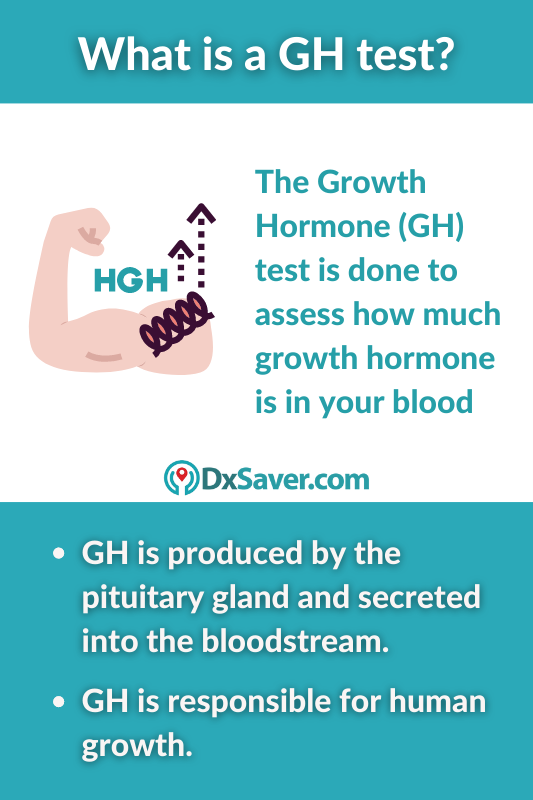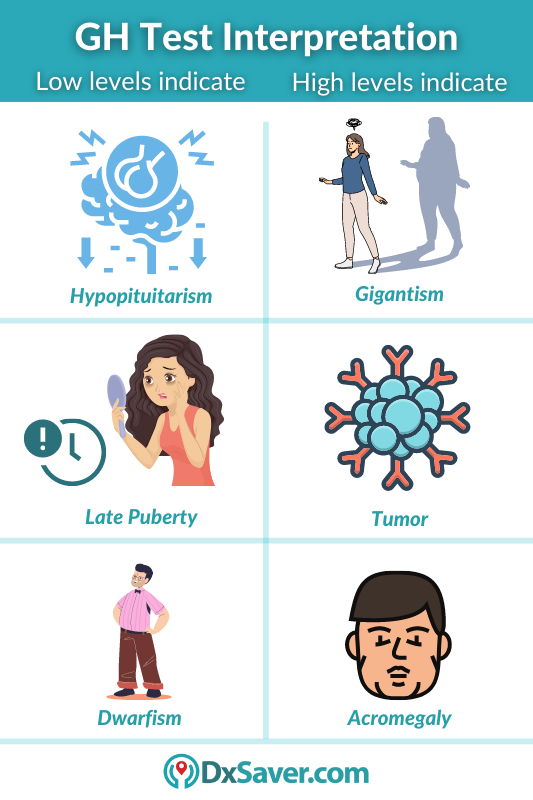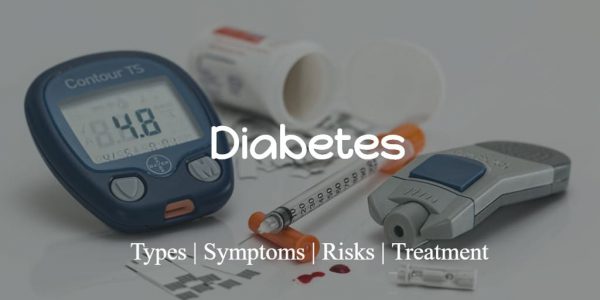
Growth hormone, GH test is a simple blood test ordered by your physician to measure the level of growth hormone in the blood. This test is generally done to find out various disorders that are caused by excess or deficiency of GH. The growth hormone is responsible for human growth and development.
The article below covers all the significant topics that are relevant to the growth hormone test. We cover the growth hormone test cost, who should get tested, normal levels, procedure, preparation, risks, and how to get tested for the growth hormone blood test.
- Growth Hormone test cost
- What is growth hormone (GH)?
- Why is a growth hormone test done?
- Who should get tested for growth hormone?
- Normal levels of growth hormone
- How is the growth hormone test done?
- Is there any preparation required before the test?
- Are there any risks in the test?
- What does the test result interpret?
- How to treat high and low GH levels?
- Providers Locations
For our readers, who are very much interested in knowing the growth hormone test cost beforehand, we would like to begin with that section.
How much does the growth hormone test cost?
Growth hormone (GH) test cost ranges between $62 and $79 in different labs and facilities across the U.S.
No prior appointment is required. Compare the price, order your test online and visit the nearest lab during lab business hours or shop the STD home testing kit. Complete the procedure and get the results in your email in 2 to 3 business days.
The following table shows the Growth Hormone testing cost at 2 of our partner laboratories (CLIA – Certified) network located across the U.S.
PersonaLabs
- Reports – 2 to 5 days
- The entire U.S. except for New York, New Jersey & Rhode Island
- Required to visit the lab
Starting from
$62
HealthLabs
- Reports – 1 to 3 days
- The entire U.S.
- Required to visit the lab
Starting from
$99
$79
Growth hormone test cost with insurance
Most of the health insurance policies in the U.S. do not cover the cost of the growth hormone test unless it is medically necessary. However, the coverage offered by private health insurance companies and national health insurance programs like Medicare and Medicaid varies widely. So we recommend you to check the coverage of your health insurance plan before getting tested for growth hormone blood test.
Our growth hormone testing providers do not accept any kind of health insurance plan. But, on request, they can provide you with an itemized receipt containing all the details like the name and code of the test, and CPT code that is necessary for insurance reimbursement purposes.

What is growth hormone?
The growth hormone is also known as Human Growth Hormone, HGH, GH, and Somatotropin. The human growth hormone is one of the natural hormones secreted by the pituitary gland and discharged into the bloodstream. The pituitary gland is a tiny pea-sized organ that is located at the base of the brain. This gland is called the master gland as it produces hormones that control various body functions.
Growth hormone helps to control the growth and chemical reactions in our body. It plays an important role in normal human growth and development, especially in children and adolescents. This hormone is also essential for tissue repair, muscle growth, bone strength, brain function, physical and mental health, energy, and metabolism.
Why is a growth hormone test done?
The growth hormone test is generally done to identify various disorders resulting from the deficiency or excess production of GH. It is a simple blood test done to measure the amount of growth hormone present in the blood.
It is also done to monitor the effectiveness of ongoing treatment for excess production or deficiency of growth hormone.
Who should get tested for growth hormone?
Children and adults with the following problems should get tested for growth hormone.
In children:
- Dwarfism
- Acromegaly (abnormal growth of the hands, face, and feet)
- Fatigue
- Weakness in the bones
- Delayed puberty
In adults:
- Feeling energy-less
- Depression
- A decline in the muscle mass
- Weight gain
- Less strength
Normal levels of growth hormone
The normal range of growth hormone (GH) levels might vary slightly between the labs. However, the standard range of the GH level is considered to be above 5 ng/ml (nanogram per milliliter) in children and above 4 ng/ml in adults.

How is the growth hormone test done?
The growth hormone test is a simple blood test that can be done using a blood sample. During the test, a phlebotomist will wrap an elastic band around your arm to make the veins visible and swell with blood. The area to be injected will be cleansed with a disinfectant liquid. Then, he/she will inject a needle into the vein to draw some blood. After removing the needle, a cotton ball or a band-aid will be used to apply pressure on the injected area to stop bleeding. The blood sample which is collected in a test tube will be sent to the laboratory for further testing.
It takes less than 5 to 10 minutes to perform this test.
Is there any preparation required before the test?
The growth hormone blood test requires some special preparations. Your physician may ask you to fast for 12 hours before the test. Avoid some medications like insulin, birth control pills, and do not exercise or do any workout before the test as they might influence the accuracy of test results by increasing or decreasing the GH levels. If you have any abnormal bleeding disorder, inform your physician or phlebotomist before the test.
Are there any risks in the test?
There are no possible risks or complications in the growth hormone blood test. After the blood sample is drawn, you might feel dizziness, slight pain, bruise or redness in the injected area for a few minutes.
What does the test result interpret?
If the growth hormone levels are higher than normal, it indicates the following medical conditions.
- Possible acromegaly
- Gigantism
- A tumor (in rare cases)
If the GH levels are lower than normal, it indicates the following medical conditions.
- Possible dwarfism
- Late puberty
- Slow growth
- Hypopituitarism (improper functioning of the pituitary gland)
As the growth hormone issues are also related to other glands such as thyroid, your physician may recommend you to take some additional blood test like TSH (thyroid-stimulating hormone) test.
How to treat high and low GH levels?
Your physician will prescribe a growth hormone therapy (injections of growth hormone into the body) if your GH levels are low. This is the most common treatment recommended for growth hormone deficiency in both children and adults. During the therapy, your physician will check your cholesterol levels, blood glucose levels, and bone density to ensure that they are at healthy levels.
Drugs that block growth hormone may be injected in the case of excess GH levels.
Providers Locations
The growth hormone blood test can be done in any of the following locations across the U.S. by visiting the nearest lab. To know the growth hormone test cost, refer to the first section of the article.
- Alabama
- Arizona
- Arkansas
- California
- Colorado
- Connecticut
- Delaware
- Florida
- Hawaii
- Georgia
- Idaho
- Illinois
- Indiana
- Iowa
- Kansas
- Kentucky
- Louisiana
- Maine
- Michigan
- Minnesota
- Mississippi
- Missouri
- Montana
- Nebraska
- Nevada
- New Hampshire
- New Mexico
- North Carolina
- North Dakota
- Oklahoma
- Oregon
- Pennsylvania
- Puerto Rico
- South Carolina
- South Dakota
- Tennessee
- Texas
- Utah
- Vermont
- Virginia
- Washington
- West Virginia
- Wisconsin
- Wyoming
Other topics you may be interested in:-
- Gonorrhea Symptoms in Men
- Eye Chlamydia Symptoms
- What STDs cause Sore Throat?
- Anti-Mullerian Hormone, AMH Test Cost in the U.S.
- How much does the Ovarian Cancer, CA – 125 Test Costs in the U.S?
- Cost of Cancer Tests in the U.S.
- Lipid Profile Testing, Normal Levels & Diagnosis
- STD Test Cost in Atlanta, Georgia
- At-Home Chlamydia Testing Cost in the U.S.
- STD Testing Cost in San Diego, California
- What is Lyme Disease | Lyme Disease Testing near me
- How much does the Ferritin Test Cost in the U.S?
- Cost of Cortisol Testing in the U.S.
- Causes of Penile Rashes and Other STD Symptoms in Men
- Hepatitis B Symptoms, Causes, Treatment, Prevention & Risks
- What is Oral Chlamydia? Get Tested for Chlamydia STD at-home
- HPV in Women: Symptoms, Genital Warts, Treatment and More
- What is Metabolism and its Normal Levels?
- LDH Hormone Normal Levels, Abnormal Levels Symptoms, Diagnosis & Treatment






